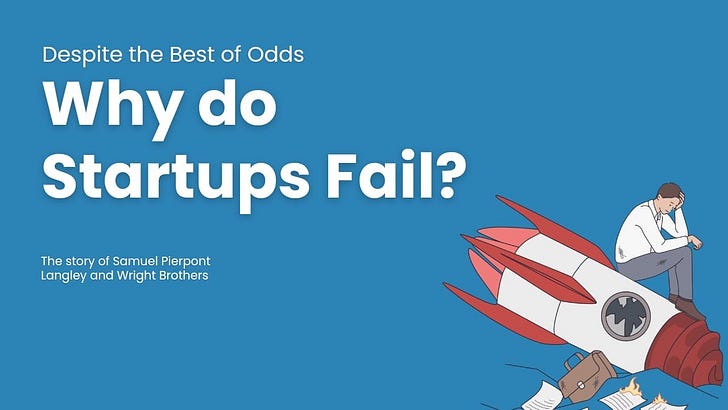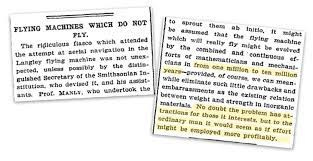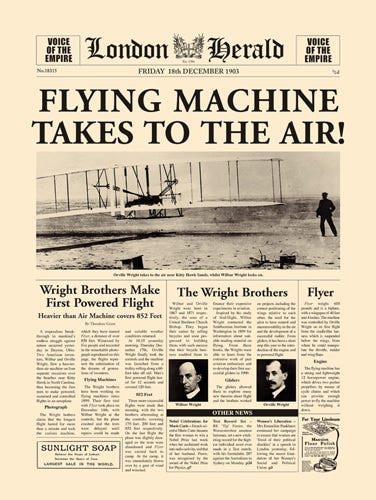🤔 The Wright Brothers Story: Why Do Some Startups Fail and Others Succeed?
The story of the first aeroplane has a lot of lessons for the current startup ecosystem. It highlights why some startups fail despite having it all and some succeed by just getting the basics right.
Some startups seem to have it all:
Founders from great institutes
Funding and VC-backing
Talented employees
But they still fail. Why?
We asked the same question. And weirdly enough, we found the answer in one of history’s most famous stories: the story of the Wright Brothers, who created the first aircraft that was capable of manned flight.
Let’s dive deeper into the Wright Brothers' story to understand why some startups fail and others succeed.
⏰ Back in Time
The year was 1898.
All the major countries in the world were focusing on the first edition of the space race: the race to conquer the skies.
The race that would finally fulfil the human desire to fly. The race to build an aeroplane..
And the US Government found the perfect candidate to fulfil this dream: A physicist, astronomer and a professor.
The man was Samuel Langley.
Why was he worthy of such a task? Well, he was a big shot of his time. Not only was he super intelligent (he was the one who figured out unmanned flight) he also had super influential friends like Alexander Graham Bell.
The US government trusted him with $50,000 (around $1 million in today’s time) to build an aeroplane.
What were the Wright Brothers doing at this time?
⚡The Wright Brothers
The Wright Brothers were running a bicycle shop.
These young boys were super fascinated by aeroplanes ever since their dad got them a catapult-powered toy plane.
And they had an inspiration to look up to: Langley.
They now knew how to spend their savings (mostly revenue from their bicycle shop): in building an aeroplane.
Thus began their experiment: no college degree, sometools from their bicycle shop and a few employees who were equally inexperienced.
Sounds like a recipe for disaster, no?
But we now know that Langley with all his expertise couldn’t crack flying.
He failed twice, in October and December 1903.
In fact, his failure was so prominent that The New York Times claimed that man would not be able to fly for a 1-10 million years!
9 days later, the Wright Brothers created history! demonstrated the first ever aeroplane!
They made the impossible possible. They made the first powered flight.
While the Wright Brothers created history, this story serves a great lesson for the startups of today. Here are our key takeaways:
🧐 What Brings Success to Startups
Innovation: While Langley relied heavily on his funding and his fancy employees, the Wright Brothers relied on "jugaad" or innovation. They built their own wind tunnels to understand how aircrafts could fly. They tested their planes themselves.
Focus: Langley was focused on the wrong problem: how much power it would take to run the plane. The Wright Brothers identified that the bigger problem was balance and focused on that.
Motivation: Langley's motivation was to go down in history as an innovator: which probably didn't inspire his employees. The Wright Brothers were just interested in solving a problem, which inspired employees.
💡ReadOn Insight: The Wright Brothers had their “why” sorted. That’s one of the key reasons for any organisation’s success. Most organisations know what they are supposed to do and how.
However, many don’t know why they are supposed to do what they are doing.
This “why” is they key for motivating workers, for bringing people on board who are aligned with your vision and for ensuring overall success (of course other things also matter).
This “why” could make all the difference.
Side note: While we were looking at Langley and the Wright Brothers we noticed their situations were pretty similar to Byju’s and Physicswallah.
While Byju’s like Langley is well-funded, Physicswallah like the Wright Brothers was bootstrapped.
While Byju’s is surrounded in controversy right now, Physicswallah is booming.
To be fair, Byju’s is course-correcting now, going back to the basics, but will it be able to gain users' trust? Will it be able to figure out its “why”?
What other startups do you think need to take this lesson from the Wright Brothers and focus on its “why”?
Let us know if you found this informative. You can reply to this email with your responses or ping us directly on WhatsApp!





Very good article and brilliantly summed up. Reminded me of a chapter in book, the psychology of money where two investors who had same back ground and time but one ended up loosing and other in keeping wealth over a period by following simple steps.